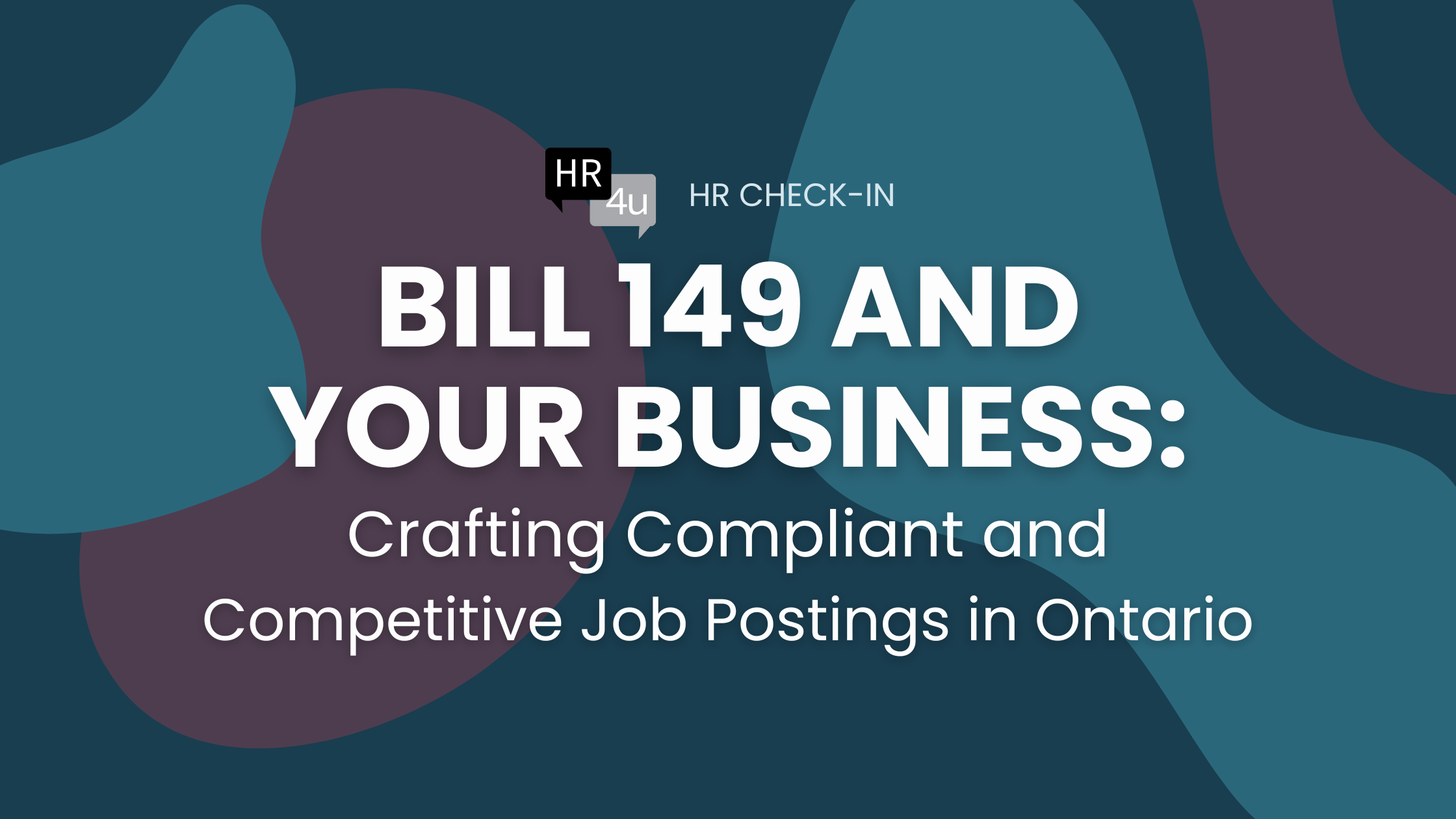Crafting Compliant and Competitive Job Postings in Ontario
As employers, you’re no stranger to the constant evolution of employment laws and regulations. Bill 149, recently receiving Royal Assent in Ontario, introduces significant changes that directly impact how businesses approach their recruitment strategies. Among the notable amendments are requirements regarding compensation disclosure and the elimination of Canadian experience requirements in job postings. In today’s edition of HR Check-In, we’ll guide you on crafting compliant and competitive job postings that adhere to Bill 149. We’ll delve into these changes and discuss strategies that will set your business apart in this competitive job market.
Understanding the Changes:
- Compensation Transparency: Employers are now mandated to include information about the expected compensation for a position, or a range of expected compensation, in any publicly available job posting. This move towards transparency aims to provide candidates with essential information upfront, fostering trust and transparency in the recruitment process.
- Elimination of Canadian Experience Requirements: Another significant change is the prohibition of including any requirement related to Canadian experience in job postings or associated application forms. This change aims to promote diversity and inclusivity in the workplace by removing unnecessary barriers for newcomers to Canada.
Crafting Compliant and Competitive Job Postings:
- Embrace Compensation Transparency: When articulating compensation ranges, aim for clarity and specificity. Instead of vague statements like “competitive salary,” provide a clear range based on industry standards, experience level, and location. For example, “Salary range: $60,000 – $70,000 annually, commensurate with experience and qualifications.
- Focus on Inclusivity: Highlight your commitment to diversity and inclusion in your job postings. Emphasize your company’s dedication to creating an inclusive work environment where all individuals, regardless of background, are valued and respected.
- Assessing Qualifications Without Canadian Experience: Instead of focusing solely on Canadian experience, prioritize assessing candidates’ skills, qualifications, and relevant experience. Look for transferable skills and experiences that align with the job requirements, regardless of where they were acquired. Consider implementing skills assessments or competency-based interviews to gauge candidates’ suitability for the role.
Case Study: Effective Compliance Strategies
Let’s explore a hypothetical real-world example of a company successfully navigating the changes brought about by Bill 149:
Case Study: XYZ Tech Solutions
XYZ Tech Solutions, a leading tech company in Ontario, recognized the importance of compliance with Bill 149 while maintaining their competitive edge in attracting top talent. To ensure compliance, they revamped their job postings to include clear compensation ranges and removed any references to Canadian experience requirements.
Additionally, XYZ Tech Solutions revamped their recruitment process to focus on assessing candidates’ skills and qualifications rather than solely relying on Canadian experience. They implemented skills assessments tailored to each role and conducted competency-based interviews to evaluate candidates’ fit for the position.
As a result of these changes, XYZ Tech Solutions not only remained compliant with Bill 149 but also positioned themselves as a forward-thinking and inclusive employer in the competitive tech industry. They attracted a more diverse pool of candidates and ultimately hired individuals based on their skills, qualifications, and potential for success within the organization.
Navigating the changes introduced by Bill 149 requires a strategic approach to crafting job postings that are both compliant and competitive. By embracing compensation transparency, fostering diversity and inclusion, and assessing qualifications beyond Canadian experience, businesses can attract top talent while staying ahead of regulatory requirements. Remember, compliance isn’t just about following the rules—it’s about creating a workplace where every individual has the opportunity to thrive. For personalized guidance on aligning your job postings with Bill 149 while enhancing your talent acquisition strategy, please reach out to HR4U today.


